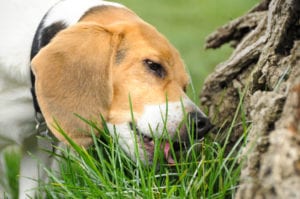Why Is My Dog Eating Grass in Centennial, CO
Have you noticed that your dog likes to play a fun little game where they run out into the yard, munches on some tasty blades of grass, and almost immediately throws it up? It seems this is a common activity for many dogs, despite the not-so-nice end result! While this may leave you scratching your head in confusion, there are many reasons why dogs eat grass.
Believe it or not, many dogs have this strange obsession and your pup is not alone! In fact, in one study, 79% of the 49 dog owners said their dog had eaten plant matter at some point in time. It’s also in their DNA. Even today, wild dogs are known to occasionally eat grass. Veterinarians often link this with pica. Pica is a disorder where your dog eats things that aren’t food. This could include grass, fecal matter, or even your socks! The reason your dog might be suffering from pica could be boredom, a nutritional deficiency, or that they simply like the taste. Continue reading to learn more and if you have any questions, call Festival Animal Clinic in Centennial at (303) 850–9393.
Your Dog May Have an Upset Tummy
It’s not uncommon for dogs to end up vomiting after eating grass, but it doesn’t always happen. There is some evidence to suggest that your pup turns to grass when they have an upset tummy, but that hasn’t been proven. In some studies, as few as 10% of dogs appear to be sick prior to consuming grass. Others believe that when your dog eats grass, they tickle the throat and stomach lining and that this sensation can result in your dog throwing up.
Maybe Your Dog’s Diet is to Blame
There are others out there who suggest that dogs eat grass to improve digestion, treat intestinal worms, or fulfill a nutritional need like for fiber. There’s even an example of a poodle who ate grass and vomited every single day for a whole seven years, and when the owner put the dog on a high fiber diet, he never ate grass again. That being said, your dog’s diet could be missing a key component, and it would be a good idea to talk to your vet in Centennial, CO about his eating habits and current diet.
Try to Keep Your Dog Occupied
Eating grass in itself is not bad, but if you’re concerned that boredom may be the culprit, you can try to get your dog some more exercise. Longer walks or extra fetch sessions are great ways to wear out your dog so that boredom isn’t as big of an issue. You could also consider putting your dog into doggie day care a few times a week to alleviate some of the boredom, especially if you work long hours and aren’t able to let them out during lunch.
Is Grass Toxic?
It’s important to note that grass alone isn’t actually harmful, but the things found in and around the grass can be. This includes herbicides, pesticides, and various plants found naturally in yards and parks. Be cautious of what you spray and where your dog eats the grass.
If you’re nervous that your pup was exposed, contact your vet and take their recommended next steps. You can also use the ASPCA’s Animal Poison Control Center website as a resource for toxic and non-toxic plants. You don’t want your dog eating grass and then accidentally ingesting a leaf or another part of a toxic plant.
When To Consult Your Veterinarian in Centennial, CO
As with anything to do with dogs, you should consult your veterinarian if you notice your dog is eating a lot of grass despite getting plenty of exercise, stimulation, and a well-balanced diet. While there may be nothing wrong, they can rule out possible underlying issues that could be causing your dog to eat grass in the first place. If you have questions or concerns about this somewhat strange behavior, please give our animal hospital in Centennial, CO a call at (303) 850-9393 or make an appointment.

